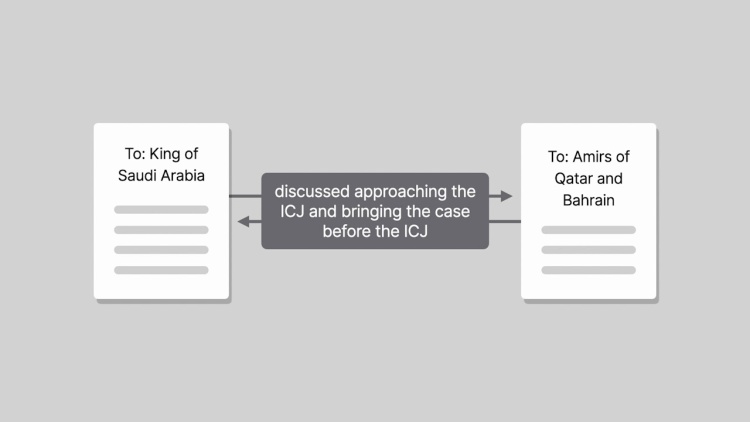Maritime Delimitation and Territorial Questions (Qatar v. Bahrain)
International Court of Justice
1994 I.C.J. 112
- Written by Megan Petersen, JD
Facts
Qatar (plaintiff) brought suit against Bahrain (defendant) in the International Court of Justice (ICJ) to determine whether two exchanges of letters between the countries constituted international agreements establishing a jurisdictional basis for the ICJ to hear all disputes between Qatar and Bahrain. The first letter was drafted by the Amirs of Qatar and Bahrain through the mediation of the King of Saudi Arabia in 1987. The second document, titled “Minutes” had been signed in Qatar by the Ministers of Foreign Affairs of Bahrain, Qatar, and Saudi Arabia. Qatar argued that the two documents were international agreements creating an obligation for Qatar and Bahrain to submit to the ICJ the whole of their dispute involving sovereignty over certain islands, sovereign rights over certain sholas, and the delimitation of a maritime boundary between the two States. Bahrain argued that the two documents did not constitute international agreements, and that Qatar did not have a jurisdictional basis for bringing a unilateral suit in the ICJ. The ICJ found that both the 1987 and 1990 exchanges and their resulting documents constituted international agreements. Thus, the ICJ concluded that it had jurisdiction to hear the sovereignty and boundary disputes between Qatar and Bahrain.
Rule of Law
Issue
Holding and Reasoning ()
What to do next…
Here's why 907,000 law students have relied on our case briefs:
- Written by law professors and practitioners, not other law students. 47,100 briefs, keyed to 996 casebooks. Top-notch customer support.
- The right amount of information, includes the facts, issues, rule of law, holding and reasoning, and any concurrences and dissents.
- Access in your classes, works on your mobile and tablet. Massive library of related video lessons and high quality multiple-choice questions.
- Easy to use, uniform format for every case brief. Written in plain English, not in legalese. Our briefs summarize and simplify; they don’t just repeat the court’s language.





